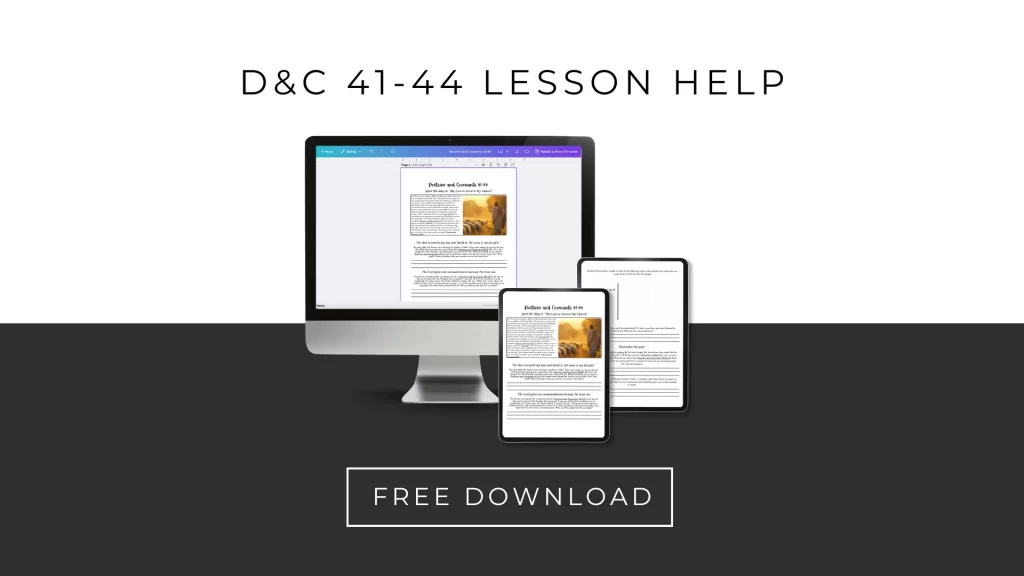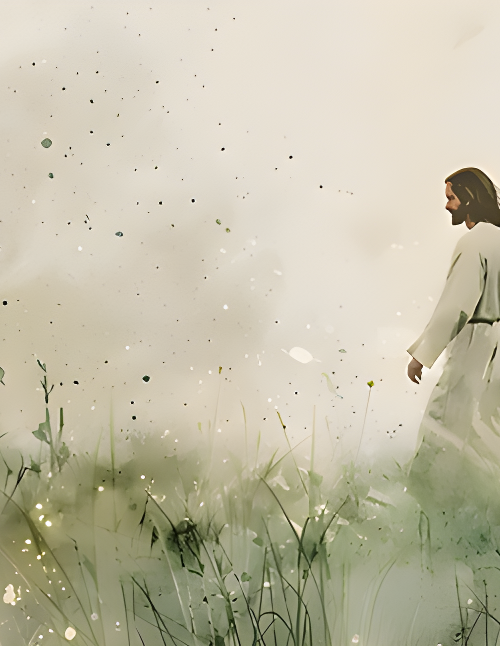
In this article, weʻll be deep diving into Doctrine and Covenants 41-44. To download our free lesson help + customizable Canva Template, click here: https://otherthanamom.myflodesk.com/dc41-44

“He that receiveth my law and doeth it, the same is my disciple.”
Engaging Questions:
- What does it mean to you to “receive” the Lord’s law—not just hear it, but truly receive it?
- According to Doctrine and Covenants 41:5, what qualifies someone to be called a disciple of Christ? How does that inspire you?
- Have you ever had an experience where living one of God’s commandments brought unexpected blessings? What happened?
- Why do you think both receiving and doing the Lord’s law are necessary to be His disciple?
- What are some commandments or gospel principles you feel prompted to live more fully right now?
- How can we help each other live the Lord’s law without judging or criticizing one another?
- What does being a disciple of Jesus Christ look like in your daily life—at home, at school, or at work?
- How can we strengthen our commitment to live God’s laws when the world offers different messages?
- Who is someone you know that quietly lives the Lord’s teachings? What do you admire about them?
- What is one small way you can better live as a disciple of Christ this week?
Object Lessons:
1. The Recipe and the Cake (Hearing vs. Doing)
Materials:
- A printed recipe for a cake or treat
- A finished treat or a picture of one
- Optional: ingredients or mixing bowl
Lesson Overview:
Show the recipe and ask, “If I read this but never mix the ingredients or bake it, will I get the cake?” Of course not. Just like a recipe, God’s commandments only bless us when we follow through. We can read His law, but we become disciples when we live it.
Discussion Points:
- What are some gospel “recipes” we’ve been given?
- Why is just knowing the commandments not enough?
- What blessings come when we act on what we’ve received?
2. The Umbrella and the Rain (Obedience Protects)
Materials:
- An umbrella
- A spray bottle or pretend “rain”
Lesson Overview:
Ask a volunteer to stand in the “rain.” Then offer the umbrella, but only if they open it. Explain that the umbrella is like God’s law—it only protects us when we use it. Just knowing it exists doesn’t shield us from life’s storms.
Discussion Points:
- How does doing God’s will protect us spiritually?
- What happens when we ignore or set aside His teachings?
- How does obedience help us feel peace even in challenges?
3. The Mirror vs. the Window (Self-Reflection Leads to Discipleship)
Materials:
- A hand mirror
- A clear glass or window
Lesson Overview:
Explain that some people use the gospel as a window—to look at others and judge. But God’s law is meant to be a mirror, helping us see what we need to change in ourselves. Disciples don’t just hear—they apply truth inwardly and live it outwardly.
Discussion Points:
- How can we shift from looking outward to looking inward?
- Why is self-reflection a key part of discipleship?
- What is one law of God you’re trying to live more fully?
4. The Two Builders (Foundation on the Rock)
Materials:
- Two models: one house on sand (soft surface), one on a rock or board
- A spray bottle or fan to simulate a storm
Lesson Overview:
Recreate Jesus’ parable: the wise man built on the rock, the foolish man on sand (Matthew 7:24–27). The house on the rock withstands the storm because it was built by someone who heard and did the Lord’s will.
Discussion Points:
- What are we building our lives on?
- How do we strengthen our foundation through obedience?
- What storms have you weathered better because you were following Christ?
5. The Instructions and the Object (Following the Plan)
Materials:
- A simple DIY craft or Lego set
- One set built with instructions, one made without
Lesson Overview:
Compare the two creations. The one built following instructions works properly or looks complete. The other is off or broken. Like that, disciples follow God’s instructions, not just their own ideas or what seems easier.
Discussion Points:
- Why is it tempting to go our own way sometimes?
- How does following God’s law lead to better outcomes?
- What’s the difference between a “fan of Jesus” and a disciple of Jesus?
6. The Light Switch (Action Turns Power On)
Materials:
- A lamp or flashlight with a visible switch
Lesson Overview:
Show that the lamp only turns on when someone flips the switch. Similarly, the gospel has power, but it’s only activated in our lives when we act in faith. Receiving God’s word is like plugging in the lamp—but obedience flips the switch.
Discussion Points:
- How does obedience bring the power of the gospel into your life?
- What is something you’ve recently acted on that brought spiritual light?
- Why is “doing” what we learn from God the mark of a true disciple?
Personal Sharing Prompts:
- Think of a time when you felt prompted to live a gospel principle more fully. How did acting on that prompting help you feel closer to the Savior?
- Think of a time when you made a sacrifice to follow a commandment. How did choosing obedience deepen your understanding of what it means to be a disciple of Christ?
- Think of a time when you studied a gospel teaching and felt inspired to change something in your life. What blessings came from doing what you learned?
- Think of a time when you saw someone else quietly and consistently live the Lord’s teachings. How did their example of discipleship inspire you?
- Think of a time when you kept a commandment even when it was difficult. How did the Lord strengthen you and bless you for your obedience?
- Think of a time when you taught a principle from the Lord’s law and felt the Spirit confirm its truth. How did that experience strengthen your commitment to live it yourself?
- Think of a time when you tried to follow Christ more deliberately in your daily decisions. How did that effort change the way you thought, felt, or treated others?
- Think of a time when keeping the Lord’s law brought you unexpected peace, joy, or guidance. How did that moment affirm your desire to be His disciple?
- Think of a time when you returned to living a gospel principle after falling short. How did repentance and recommitment help you feel like a true disciple of Jesus Christ?
- Think of a time when you recognized that discipleship wasn’t about being perfect but about being willing. How did embracing that truth help you follow Christ more faithfully?
The Lord gives me commandments because He loves me.
Engaging Questions:
- What does it mean to you that the Lord gives commandments out of love rather than control?
- Have you ever followed a commandment and later realized it protected or blessed you in an unexpected way? What happened?
- Doctrine and Covenants 42 is sometimes called “the law of the Church.” Why do you think the Lord would give His people a law right after gathering them?
- How do commandments help create peace and unity in our families, wards, and communities?
- What are some of the Lord’s commandments that you’ve come to appreciate more over time? Why?
- How do you respond when a commandment feels hard to follow? What helps you stay faithful in those times?
- What’s the connection between keeping commandments and feeling closer to Jesus Christ?
- How can understanding the “why” behind a commandment change the way you choose to live it?
- What would you say to someone who sees commandments as restrictive rather than loving?
- What’s one way you can show your love for the Lord this week by choosing to keep one of His commandments more intentionally?
Object Lessons:
1. The Guardrail on a Cliff (Commandments Keep Us Safe)
Materials:
- A picture or model of a cliff with a guardrail
- Optional: toy car and road setup
Lesson Overview:
Explain that the guardrail isn’t there to ruin your drive—it’s there to keep you from driving off the cliff. Similarly, God’s commandments don’t limit our joy—they protect it. They show that He loves us and wants to keep us spiritually safe.
Discussion Points:
- How do commandments act as spiritual guardrails?
- Can you think of a time when following a commandment protected you?
- Why is it important to see commandments as an expression of love, not control?
2. The Instructions and the Toy (Loving Guidance Leads to Best Results)
Materials:
- A simple toy, puzzle, or small item with instructions
- Show what happens when someone tries to assemble it without directions
Lesson Overview:
Explain that instructions come from the creator, and they ensure we use something correctly and get the most out of it. God, our Creator, gives us commandments to help us function at our best and experience real joy.
Discussion Points:
- Why does our Heavenly Father care how we “assemble” our lives?
- How are commandments like a manual for happiness?
- How can obedience help us discover our full potential?
3. The Parent and the Child (Rules = Love)
Materials:
- A story or role-play of a parent setting rules (bedtime, safety gear, etc.) for a child
Lesson Overview:
Ask: “Why does a parent tell their child to wear a helmet or come home by a certain time?” Not to control, but because they love their child and want to protect them. God gives commandments for the exact same reason—because He knows what’s best for us.
Discussion Points:
- How does this change how we view commandments?
- Have you ever looked back and been grateful for a rule?
- What happens when we trust that God’s love is behind His laws?
4. The Fence and the Playground (Boundaries = Freedom)
Materials:
- A picture of a fenced-in playground and an unfenced cliffside
Lesson Overview:
Explain that children play more freely when there’s a fence because they know where it’s safe. If there’s no boundary, they feel anxious and hold back. Commandments help us live with confidence, not fear—they are loving boundaries that lead to greater peace and freedom.
Discussion Points:
- How do commandments create a sense of security and peace?
- What boundaries has God given you that help you feel more free?
- How does understanding His intentions change your perspective on obedience?
5. The Prescription (God Knows What We Need)
Materials:
- An empty pill bottle labeled “commandments”
- Slips of paper inside with blessings written on them (peace, purpose, protection)
Lesson Overview:
Compare commandments to a prescription from a doctor. They might not always seem pleasant or fun, but they’re meant to heal and help. Heavenly Father gives commandments not to burden us, but to bless us and help us thrive.
Discussion Points:
- Have you ever followed a hard commandment and later seen its blessing?
- Why does God sometimes ask things of us that are uncomfortable at first?
- What “spiritual symptoms” are healed when we live God’s commandments?
6. The Flashlight in the Dark (God’s Lighted Path)
Materials:
- A flashlight and a darkened room or a hallway
Lesson Overview:
Turn off the lights and use the flashlight to guide the way. Explain that commandments are like light in the darkness—they help us know where to go and what to avoid, and they prevent unnecessary pain. The light is a gift from a loving Heavenly Father who wants us to arrive safely.
Discussion Points:
- When have you felt spiritually guided by a commandment?
- How do commandments help us see more clearly in confusing times?
- What does this tell you about God’s love and presence in your life?
Personal Sharing Prompts:
- Think of a time when following a commandment protected you from harm—spiritually, emotionally, or physically. How did that experience help you see the Lord’s love in His laws?
- Think of a time when a commandment felt hard to keep, but you trusted the Lord and saw blessings come from it. How did that deepen your understanding of His love?
- Think of a time when living a gospel principle brought you unexpected peace or joy. How did that moment confirm that the Lord’s commandments are loving guidance?
- Think of a time when you saw the blessings of obedience unfold slowly over time. How did your consistent effort help you recognize the Lord’s long-term love and care?
- Think of a time when you taught a child, friend, or class about a commandment and felt the Spirit testify of its truth. How did teaching it help you understand God’s loving purpose in giving it?
- Think of a time when you felt the Lord correct you or invite you to do better. How did that experience feel like love rather than punishment?
- Think of a time when keeping a commandment helped you feel more connected to Heavenly Father and Jesus Christ. How did that strengthen your testimony of their love?
- Think of a time when you saw someone else’s life improve as they chose to follow a commandment. How did watching their journey help you see the loving purpose behind God’s laws?
- Think of a time when you understood a commandment in a new way, and it changed your heart. How did that fresh perspective help you feel more loved and guided by God?
- Think of a time when you struggled with a commandment but prayed to understand it better. How did the Lord answer you, and how did His response reflect His love for you personally?
“Remember the poor.”
Engaging Questions:
- What does the phrase “remember the poor” mean to you personally? How can it be more than just giving money?
- Why do you think the Lord commands us to care for the poor as part of His law for the Church (D&C 42:30)?
- Have you ever had an experience where helping someone in need changed you as much as it helped them? What did you learn?
- How can we better recognize the “poor and needy” around us—not just financially, but emotionally or spiritually?
- What are some creative or meaningful ways you can serve those in need in your ward, school, or community?
- In what ways does caring for the poor bring us closer to becoming true disciples of Jesus Christ?
- What does Doctrine and Covenants 44:6 teach us about gathering and preparing to meet the Lord through service?
- How can we serve the poor with dignity and compassion, the way the Savior would?
- What are some challenges that might stop us from serving others, and how can we overcome them?
- What is one small act of service you can do this week to remember and bless someone in need?
Object Lessons:
1. The Uneven Candy Distribution (Seeing and Sharing Needs)
Materials:
- A bag of individually wrapped candy
- Hand out uneven amounts to participants (some get 0, some get 5–6)
Lesson Overview:
After the candy is handed out, ask how it feels to have too much or nothing. Then ask those with extras to offer to share. Explain that Heavenly Father blesses us so we can bless others, and He asks us to remember the poor by noticing and acting.
Discussion Points:
- How do we sometimes overlook those in need?
- What are small ways we can share our resources or time?
- How does it make you feel to share with others?
2. The Body Analogy (When One Member Hurts, All Hurt)
Materials:
- No materials needed—use the human body as an illustration
Lesson Overview:
Explain that if you stub your toe or hurt your hand, your whole body reacts—you can’t ignore it. Likewise, in the body of Christ, when one member suffers, we all should feel it. To “remember the poor” means to be spiritually aware and move with compassion.
Scripture tie-in: 1 Corinthians 12:25–26
Discussion Points:
- How does the gospel call us to “feel” with others?
- What does it mean to act like a unified body of disciples?
- Why do you think Jesus showed such special care for the poor?
3. The Two Jars (Needs vs. Excess)
Materials:
- Two clear jars
- One with a little water labeled “needs”
- One full to the top labeled “excess” or “blessings”
- A small cup or scoop
Lesson Overview:
Use the scoop to pour from the full jar into the nearly empty one. Explain that many people have less than they need, while others have more than enough. God asks us to shift our focus from self-preservation to Christlike generosity.
Discussion Points:
- What does it mean to be a steward, not just an owner, of what we have?
- What are examples of blessings we can share besides money?
- How can remembering the poor bring us closer to Christ?
4. The Hidden Picture (Looking Deeper to See the Need)
Materials:
- A picture or object covered by several layers of paper
- Slowly remove the layers to reveal what’s underneath
Lesson Overview:
Sometimes poverty and need aren’t obvious. This activity reminds us that to “remember the poor,” we must be willing to look deeper, ask questions, and notice people’s burdens—both seen and unseen.
Discussion Points:
- How can we be more spiritually aware of others’ needs?
- Why is seeing others clearly the first step to helping them?
- What does it mean to see others the way Christ sees them?
5. The Backpack of Burdens (Sharing the Load)
Materials:
- A heavy backpack
- Invite someone to carry it around, then ask others to help lighten the load
Lesson Overview:
Explain that poverty isn’t just financial—it can be emotional, spiritual, or circumstantial. Helping the poor means being willing to share their burden, not just observe it. The Lord invites us to lift each other, not walk by.
Discussion Points:
- What are different kinds of poverty people experience?
- How does helping someone with their burden bless both of you?
- What does this teach you about Christ’s example?
6. The Bread and the Table (Making Room for Everyone)
Materials:
- A loaf of bread or a roll and a picture of a dinner table
- Optional: break bread and share it during the discussion
Lesson Overview:
Use the bread to symbolize nourishment and belonging, and the table to represent the gospel community. To “remember the poor” means to invite them to partake of both physical and spiritual sustenance. Everyone deserves a seat at Christ’s table.
Discussion Points:
- How can we help others feel welcomed and cared for in church?
- What spiritual “bread” can you offer others?
- How do service and inclusion reflect Christ’s love?
Personal Sharing Prompts:
- Think of a time when you felt prompted to give to someone in need. How did following that prompting bless both you and the person you helped?
- Think of a time when someone reached out to help you during a difficult time. How did that act of kindness reflect the Savior’s love and inspire you to do the same for others?
- Think of a time when you participated in a service project or humanitarian effort. How did remembering and serving the poor change your heart or perspective?
- Think of a time when you gave more than you thought you could—whether time, money, or effort—and saw the Lord multiply your offering. How did that experience deepen your faith and compassion?
- Think of a time when teaching or talking about caring for the poor helped you better understand the Savior’s mission. How did that conversation impact your commitment to serve others?
- Think of a time when you learned about someone’s life circumstances and were moved to act. How did that moment help you see them through the Savior’s eyes?
- Think of a time when a small act of kindness made a big difference for someone in need. How did that experience teach you that remembering the poor doesn’t require grand gestures?
- Think of a time when you or your family set aside something (time, money, extras) to bless others. How did that effort bring you closer to the Savior and to each other?
- Think of a time when you noticed someone who was often overlooked and made an effort to include or uplift them. How did that simple act help you live the Savior’s invitation to “remember the poor”?
- Think of a time when you studied scriptures or listened to a talk about caring for the needy. How did the Spirit prompt you to act—and what happened when you followed that prompting?
God gives revelation to guide His Church—and to guide me.
Engaging Questions:
- What do these sections teach you about how God gives revelation to guide His Church?
- How have you seen Church leaders receive and follow revelation in recent times? How has that impacted you?
- What is the difference between revelation for the Church and personal revelation? Why are both important?
- Have you ever received personal revelation that helped you make an important decision? What did you learn from that experience?
- Doctrine and Covenants 42 and 43 show that revelation for the Church comes through the prophet. How does knowing this strengthen your trust in Church direction?
- How can you better recognize when the Spirit is trying to reveal something to you personally?
- Why do you think it’s important to act on personal revelation quickly and with faith?
- What helps you prepare to receive revelation—whether through prayer, scripture study, or other spiritual habits?
- What would you say to a friend who is unsure if they can receive revelation for themselves?
- What is one question or concern you could take to the Lord this week in prayer, seeking personal revelation?
Object Lessons:
1. The Flashlight and the Path (Revelation Brings Light One Step at a Time)
Materials:
- A flashlight
- A dark or dim area or a path made of paper footprints
Lesson Overview:
Turn on the flashlight and show that it only reveals a few steps ahead. Revelation often works the same way—it guides us just enough to move forward. God doesn’t give us the full map, but He gives enough light to act.
Discussion Points:
- When has a small piece of guidance helped you take the next step?
- Why do you think God gives revelation gradually?
- How do you keep moving forward when the full path isn’t clear?
2. The Compass and the Map (God Directs His Church and Us)
Materials:
- A compass
- A map or printed “life journey” path
Lesson Overview:
A compass helps you stay pointed in the right direction, even if you don’t know the exact path. Revelation helps the prophet lead the Church, and it helps you make personal decisions too. Both need regular checking in with the Lord.
Discussion Points:
- How is revelation like a compass in your life?
- Why is it important that the Church is led by a living prophet?
- How can we develop our own spiritual sensitivity to God’s direction?
3. The Cell Phone Signal (Revelation Requires Connection)
Materials:
- A cell phone
- A “no signal” sign
Lesson Overview:
Explain that a phone doesn’t work without a signal. Likewise, to receive personal revelation, we need to be in spiritual range—meaning we must pray, listen, and be willing to act. Just like Church leaders receive revelation through that connection, so can we.
Discussion Points:
- What helps strengthen your “spiritual signal”?
- What blocks or weakens our ability to receive revelation?
- How do we know when the prompting is from God?
4. The Radio Tuner (Tuning In to Hear God’s Voice)
Materials:
- A radio or an audio clip of static and tuning
Lesson Overview:
Play static and slowly tune to a clear station. Explain that revelation doesn’t always come loudly—we often need to tune our hearts through quiet reflection and spiritual habits. Church leaders and individuals both need to stay tuned to the Spirit.
Discussion Points:
- What helps you tune out the “static” of the world?
- How can you tell when you’ve found the right spiritual frequency?
- Why is daily personal revelation just as vital as general revelation?
5. The GPS Analogy (Recalculating but Always Guided)
Materials:
- A phone GPS app
- Optional: A printed “life path” map with a detour
Lesson Overview:
When we make a wrong turn, the GPS recalculates—but it doesn’t give up. God’s revelation through prophets helps guide the Church back on track. Personal revelation helps us course-correct and stay aligned with God’s will.
Discussion Points:
- What does this teach you about God’s patience?
- How can you better listen when He’s prompting you to adjust your path?
- How is personal revelation different—and similar—to prophetic guidance?
6. The Walkie-Talkie (Both Sides Have to Speak and Listen)
Materials:
- A set of walkie-talkies (or just use one to demonstrate)
Lesson Overview:
Explain that revelation is a two-way conversation. Like walkie-talkies, we can’t receive if we’re talking the whole time or never responding. Just as the Lord guides prophets in the Church, He guides us when we listen and then act.
Discussion Points:
- How often do we treat prayer like a one-way message?
- What’s one way you can better listen for the Lord’s answers this week?
- Why is acting on revelation an essential part of receiving more?
Personal Sharing Prompts:
- Think of a time when you felt guided by personal revelation in making an important decision. How did you know the direction came from God?
- Think of a time when you received a clear answer to a prayer. What did that experience teach you about how the Lord speaks to you individually?
- Think of a time when the words of a prophet or church leader answered a question in your heart. How did that moment strengthen your testimony that God leads His Church through revelation?
- Think of a time when you were confused or uncertain, but received peace or direction through scripture study. How did the Lord use that moment to guide you?
- Think of a time when the Lord warned, protected, or comforted you through a spiritual prompting. How did following that prompting bless your life?
- Think of a time when you felt the Lord confirm a Church policy, calling, or teaching through the Spirit. How did that confirmation help you trust in God’s ongoing guidance?
- Think of a time when you participated in a ward council, family council, or other group seeking revelation. How did the Spirit guide the group, and what did you learn about the Lord’s involvement in His Church?
- Think of a time when a talk, hymn, or conversation became an unexpected answer to a question or concern. How did the Lord use that moment to show His awareness of you?
- Think of a time when you waited patiently for revelation, and it came in the Lord’s timing. What did that process teach you about how God guides us?
- Think of a time when following even a small spiritual prompting led to a meaningful result. How did that experience build your confidence in receiving revelation personally?




Leave a Reply